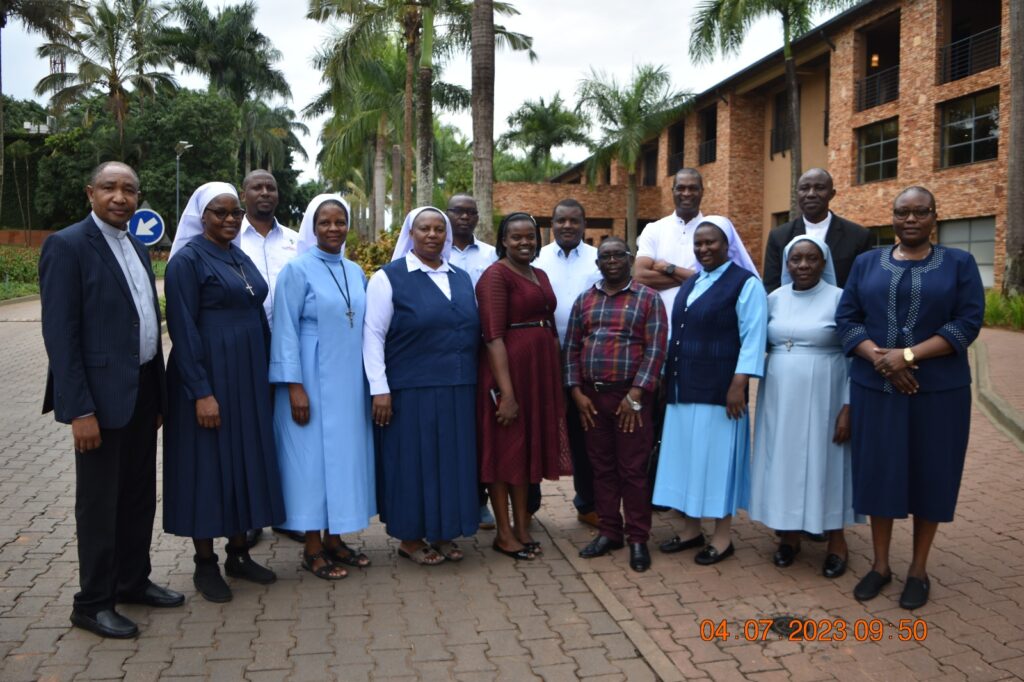AMECEA: Religious Women Urged to Continue Spearheading Child Care Reform

Sr. Jecinter Antoinette Okoth, FSSA
As various groups including Church, governments and civil societies rethink care for children by shifting away from institutional care to family and community-based care, the Secretary General for the Association of Member Episcopal Conferences in Eastern Africa (AMECEA) has asked Religious women to be at the forefront for the realization of this dream in the region.
Addressing the Project Managers for the Catholic Care of Children (CCC) from four countries within the AMECEA region who gathered in Kampala, Uganda, to reflect on the recently launched synthesis of baseline surveys dubbed ‘regional portrait’ Fr. Anthony Makunde acknowledged the move already initiated by the Catholic Sisters and commended them to lead the reform process in their respective countries.
“We are aware that the Sisters are already conversant with this process and have done a lot towards care of children and care reforms and we are grateful to that. In this case, it was commended by the bishops at the launch of the portrait at Boma Hotel in Nairobi that the Sisters be the pilots and drivers as the bishops, Religious men and clergy follow their example,” Fr. Makunde said on Tuesday, July 4, while speaking to the participants during the opening session of the workshop.
As the Sisters spearhead the process, the Secretary General insisted, “We have to assist each other and make this a regional move and also reach others… and come up with an action plan so that this mission can be successfully accomplished.”
Stressing on the objective of the three-day workshop from 4-6, July, that brought together representatives from Uganda, Kenya, Zambia and Malawi, Fr. Makunde who has been the Secretary General of AMECEA since 2018 said, “We are here to continue building from the good foundation that has been laid by a number of stakeholders especially the sisters in this initiative on care of children. It is now growing slowly and we look forward to the remaining countries within AMECEA and ACWECA (Association of Consecrated Women in Eastern and Central Africa) regions to be on board.”
He underscored that the remaining countries are not just to join the process of care reform for the sake of it, but they must understand that “We have a responsibility to read the signs of the times, and caring for children in families is one of those signs.”
“We have a duty not because it is a project but it should be a commitment with or without a project,” the Tanzanian cleric said adding that the participants during the workshop will revisit the baseline study already done in the four countries to understand the situation at hand.
Taking the participants through the regional portrait, Coordinator for AMECEA Social Communications, Fr Andrew Kaufa, highlighted that data from the baseline surveys is important for the Church to make evidence-based decisions, to addressing the emerging problems and for the CCCs to objectively evaluate their performance.
“While the regional portrait gives as a report on the progress so far made in shifting from institutionalized care for children to putting as our centre of focus the family environment, the portrait also shows the important for the CCCs to be appreciate the data and be conversant with the entire portrait; to take the evidence as tool for us to win the hearts and minds of our stakeholders who include the pastoral agents, men Religious, policy makers, academicians, Small Christian Communities and funding partners; and for the individual CCCs to identify and translate the gaps within their country into actionable points from their local perspective,” said Fr Kaufa.
After sharing their reactions to the regional portrait by capturing enablers, Best Practices, gaps, the managers of the four CCCs have resolved to come up with strategies that will ensure that all the stakeholders are engaged in the process, to build the capacity of their staff, and to ensure that families are strengthen in view of care for the children.


